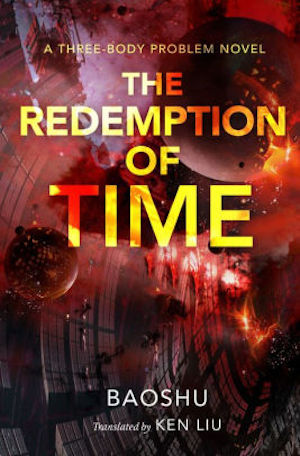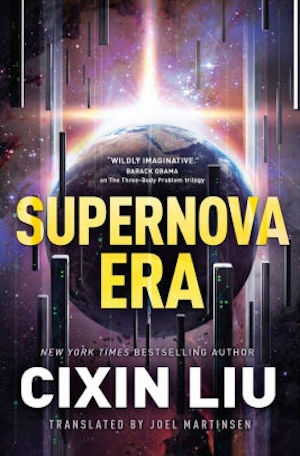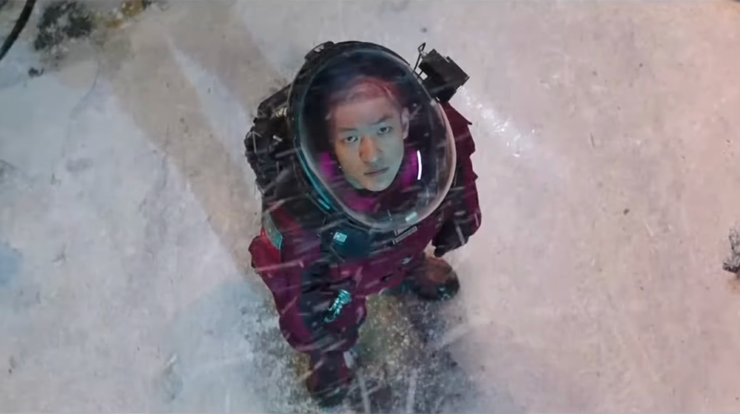When Chinese science fiction film The Wandering Earth appeared in U.S. theaters earlier this year, very few people saw it, but just about all of them liked it. Critics lamented that this movie, which grossed nearly as much as Avengers: Endgame worldwide, received only a few days’ booking in the more discerning arthouses and the most diverse big-city multiplexes. Now that The Wandering Earth has made its way to Netflix, it has a new chance to find a wider audience. Many lesser films have thrived on the streaming service—let’s hope Netflix helps this movie find the American viewership it deserves.
The Wandering Earth is adapted from a novella—though some say it’s more a long short story—by Liu Cixin, author of The Three-Body Problem. Since this particular work isn’t yet available in English translation, I can’t vouch for the faithfulness of the adaptation. I can merely express my admiration at Liu’s audacity in fitting such a large story into such a small space.
Let’s summarize: In the nearish future, sometime after 2044, it’s discovered that the sun is expanding and will destroy Earth within a century or so. To prevent this, the nations of the world form the United Earth Government and construct 10,000 gigantic rocket boosters that will allow the Earth to exit the solar system. Each of the boosters is so huge that an entire underground city can fit below it. This is fortunate, since moving away from the sun will put the Earth into another Ice Age, while stopping planetary rotation to ensure navigability will cause superstorms that will destroy much of the world’s population. The 4.2-light-year voyage to a new solar system, during which the planet will eventually reach half the speed of light, will take 2,500 years. Throughout, most of humanity will remain underground, though elevators to the surface will continue to run: workers in “thermal suits” must mine the fuel that will power the enormous boosters. A few more humans live off-planet on a space station that accompanies the Earth; their tours of duty, some of them spent in suspended animation, last upwards of fifteen years.
Buy the Book


The Redemption of Time
Just as some journeys of a thousand miles go awry at the first step, the Wandering Earth’s trip runs into trouble early. The story proper begins seventeen years into the millennia-long expedition, on the day that Earth begins its approach to Jupiter, which it will use as a gravity slingshot. It’s an eventful day for the Wandering Earth Project, and an even more significant one for a frustrated young man named Liu Qi. He has spent almost his entire life below ground with his adopted sister, Duoduo, and his grandfather Zi’ang, who works on the surface driving the huge trucks that transport the ore that keeps the local rocket booster running. Liu Qi’s father, Liu Peiqiang, is due to return from fifteen years aboard the space station, but Liu Qi would rather visit the surface of the planet than reunite with the absent father he resents, so he arranges to take Duoduo on a tour of the surface.
Of course the day Liu Qi plays truant and Liu Peiqiang prepares his return to Earth is also the day that an energy spike from Jupiter takes several thousand rockets offline, spurs worldwide earthquakes, splits a tectonic plate or two, and sucks much of Earth’s remaining atmosphere into space. Liu Qi, Duoduo, and Zi’ang on Earth and Liu Peiqiang on the space station find themselves drafted into the global effort to save the planet before Earth vanishes into Jupiter’s clouds. There’s a desperate race across a collapsing landscape, a perilous ascent of a crumbling building, a deadly spacewalk, a plane crash, and more. Aside from the space station A.I., which does cruel things to keep humanity alive, there’s no real villain: the subzero temperatures of Earth, the vacuum of space, and the gravity of Jupiter pose sufficient threat.
The Wandering Earth shows the world coming together against an apocalyptic threat; it’s true that the Chinese protagonists ultimately save the day, just as Americans tend to ride to the rescue in Hollywood films, but the damage that Jupiter inflicts affects the whole world. So the film makes it clear that people of every race and nationality have worked together to avoid extinction; the United Earth is genuinely united. For all the sacrifice the Wandering Earth Project entailed—there are only 3.5 billion people left on this future planet—the international themes are stirring. We see other rescue crews at work and hear them interacting in their native languages; an emotional highlight is a conversation between a Chinese astronaut and his Russian comrade. They dream that their descendants, millennia hence, will fish together on the unfrozen waters of Lake Baikal. Alas, the sole significant English speaker is a villainous computer.
This international strain extends to The Wandering Earth’s plotting and production design, much of which is reminiscent of previous science fiction films. There are visual and thematic parallels to Interstellar; the frozen surface with its skyscraping glaciers calls to mind The Day After Tomorrow and Snowpiercer; the cramped underground city could be the Mars of Total Recall, though the grand elevators to the surface are on loan from Akira or Neon Genesis Evangelion. There’s a spacewalk sequence that wouldn’t be out of place in Gravity and a sinister A.I. with the camera face, the dubious sanity, and the chilling matter-of-factness of 2001’s HAL. And for those with a deep knowledge of mediocre films, the central idea of moving the Earth with rockets summons up memories of the 1962 Japanese film Gorath, a lesser effort from frequent Godzilla director Honda Ishiro.
Buy the Book


Supernova Era
But it’s not the homages and echoes, as accomplished as they are, that I’ll remember from The Wandering Earth. No, what will stick with me are the abundant flashes of originality. To give just one example, towards the end of the film, Liu Qi stands on a sea of ice in a bright red spacesuit. (The Wandering Earth, unlike many recent Hollywood blockbusters, does not fear vibrant colors.) The upper body of a whale, caught mid-leap in the cataclysm that froze the world, dominates the middle ground. The sky fills most of the frame; instead of the blue of Earth’s atmosphere or the black of space, Jupiter’s roiling storms, looking close enough to touch, fill the air above Liu Qi’s head. It’s as striking an image as I’ve seen in a science fiction film, and there are several such moments in The Wandering Earth. This is a movie to thrill and stir the most jaded SF fan.
A final note: Netflix, in its wisdom, defaults The Wandering Earth to an English dub, but the original Mandarin soundtrack is also available, as are English subtitles. Though the subtitles are the slightest bit stilted and deserved a few more rounds of editing, I suggest that Anglophone viewers watch the movie in its original language, with its actors’ voices intact.
The Wandering Earth is one of the best big screen adventures I’ve seen in years, and if you have a Netflix account, you can watch it tonight. I urge you to tune in.
Matt Keeley reads too much and watches too many movies. You can find him on Twitter at @mattkeeley.










